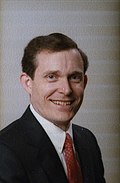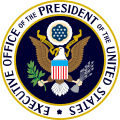 | |
| Agency overview | |
|---|---|
| Formed | August 16, 1993 |
| Jurisdiction | Federal Government of the United States |
| Headquarters | Eisenhower Executive Office Building |
| Employees | 25 |
| Agency executive |
|
| Parent agency | Office of White House Policy, Executive Office of the President of the United States |
| Website | Official website |
The Domestic Policy Council (DPC) is the principal forum used by the president of the United States for the consideration of domestic policy matters and senior policymaking, and includes Cabinet members and White House officials. The Council is part of the Office of Policy Development, which itself is within the Executive Office of the President of the United States.
Contents
Since the establishment of the Council in 1993, under the administration of President Bill Clinton, its purpose is to coordinate the domestic policy-making process; to coordinate domestic policy advice to the president; to ensure that domestic policy decisions and programs are consistent with the president’s stated goals, and to ensure that those goals are being effectively pursued; and to monitor implementation of the president’s domestic policy agenda.
The Domestic Policy Council differs from the National Economic Council, which is used to consider economic policy for the president. The Domestic Policy Council focuses on issues of domestic policy, which exclude economic policy matters. The Council is also the principal arm of the president when coordinating domestic policy measures throughout the executive branch.
The Domestic Policy Council is headed by the assistant to the president for domestic policy and director of the Domestic Policy Council. Since January 20, 2025, that position has been held by Vince Haley. [1]





















